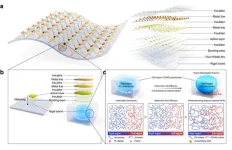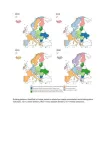(Press-News.org) The World Economic Forum, in association with Frontiers, new Top 10 Emerging Technologies of 2024, released today (25 June), shows that among technologies emerging globally, reconfigurable intelligent surfaces (RIS) and High-Altitude Platform Systems (HAPS) have the potential to connect billions worldwide who currently have no internet access.
The report also highlights how advances in genetically engineering animal organs for use in human transplantation gives hope to the millions on waiting lists worldwide. Other technologies in the top ten that that could transform lives and societies globally include:
Artificial Intelligence (AI)-enabled discoveries that could lead to improved disease management, better understanding of our bodies and minds, and new materials that benefit health and economies worldwide.
Climate change-addressing technologies, ranging from engineered organisms that convert carbon dioxide emissions into products and elastocalorics that emit heat under stress and absorb heat when relaxed, transforming energy use and efficiency.
“Organizations make better choices when they understand the factors shaping the future. The report identifies technologies poised to significantly influence societies and economies,” said Jeremy Jurgens, Managing Director, World Economic Forum, and Head of the Centre for the Fourth Industrial Revolution. “The report spotlights technologies with immense potential for revolutionizing connectivity, addressing the urgent challenges of climate change and driving innovation across various fields.”
Frederick Fenter, Frontiers’ Chief Executive Editor, commented, “Drawing on the expertise of Frontiers’ field chief editors worldwide brings our shared commitment to transformative science into clear focus, offering insight and clarity to breakthrough technology that has the ability to change societies, economies, and lives for the better. This is open science in action, and we are delighted to partner with the World Economic Forum in bringing these technologies to the attention of business, science, and political leaders across the globe.”
The full top ten list is as follows:
AI for Scientific Discovery: Pioneering New Frontiers in Knowledge
Privacy Enhancing Technologies: Empowering Global Collaboration at Scale
Reconfigurable Intelligent Surfaces: Transforming Wireless Connectivity with Smart Mirrors
High-Altitude Platform Systems: Bridging the Internet Divide from the Stratosphere
Integrated Sensing and Communication: Building Next Generation Networks with Digital Awareness
Immersive Technology for the Built World: Laying New Foundations for Construction and Maintenance
Elastocalorics: Powering Heat Systems to Work like Muscles
Carbon Capturing Microbes: Engineering Organisms to Convert Emissions into Valuable Products
Alternative Protein Feeds: Revolutionizing Animal Nutrition for Sustainability
Organ Transplant Genomics: Gene-editing Organs for Transplantation Advancements
END
Internet for billions in 100 countries with no current access and hope for transplant patients worldwide in new World Economic Forum emerging technologies report
2024-06-25
ELSE PRESS RELEASES FROM THIS DATE:
A new paradigm in photothermal therapy! DGIST developed “ultrasound-assisted photothermal therapy (ULTRA-PTT)” technology!
2024-06-25
□ Professor Jin-ho Chang’s research team from the Department of Electrical Engineering and Computer Science at DGIST (President Kun-woo Lee) developed “Ultrasound-assisted photothermal therapy (ULTRA-PTT)” technology that significantly enhances the performance of conventional photothermal therapy. This technology was developed in collaboration with Senior Researcher Hye-min Kim from the Advanced Photonics Research Institute at GIST (President Ki-chul Lim) using the team’s proprietary “ultrasound-induced optical clearing” technology.
□ Phototherapy, using light, ...
Nanowires create elite warriors to enhance T cell therapy
2024-06-25
Adoptive T-cell therapy has revolutionized medicine. A patient’s T-cells — a type of white blood cell that is part of the body’s immune system — are extracted and modified in a lab and then infused back into the body, to seek and destroy infection, or cancer cells.
Now Georgia Tech bioengineer Ankur Singh and his research team have developed a method to improve this pioneering immunotherapy.
Their solution involves using nanowires to deliver therapeutic ...
Plant-sourced nitrate proves positive to human health
2024-06-25
Plant-sourced nitrate proves positive to human health
New research from Edith Cowan University (ECU) has found that nitrate from plant sources is associated with a lower risk of mortality while nitrate from other sources such as animal-based foods, processed meat and tap water, is linked to a higher risk of mortality.
Nitrate, a compound found in vegetables, meat, and drinking water, has been the subject of debate due to its potential impact on health. Emerging evidence suggests that dietary nitrate may play a role in preventing cardiovascular disease (CVD), dementia, and ...
DGIST-POSTECH joint research team developed next-generation impact-resistant stretchable electronic component
2024-06-25
□ Professor Kyung-In Jang’s research team from the Department of Robotics and Mechatronics Engineering at DGIST (President Kunwoo Lee) has succeeded in developing a highly stable stretchable electronic device, which overcomes the mechanical limitations of conventional inorganic materials and enhances their stretchability and durability. In collaboration with Professor Taeho Park’s team from the Department of Chemical Engineering at POSTECH (President Seong-Keun Kim), the research team has developed a stretchable hybrid polymer and applied it to electronic devices, enabling them to operate stably even under deformation ...
Robots help put brakes on inflammatory diseases
2024-06-25
Fully automated diagnostic techniques, including liquid handling robots, are poised to improve the lives of millions of people living with inflammatory diseases worldwide.
A landmark WEHI study has revealed new methods in detecting necroptosis, a key factor in many inflammatory diseases like psoriasis, arthritis and inflammatory bowel disease.
The findings mark a huge leap forward in our ability to diagnose necroptosis accurately. They also offer practical methods that can be easily reproduced in hospitals worldwide, giving hope for new ways to treat inflammatory diseases.
At a glance
Necroptosis is a form of cell death, one of the body’s natural ...
Chronic loneliness may increase stroke risk among older adults
2024-06-25
Embargoed for release: Monday, June 24, 7:30 PM ET
Key points:
In a study of loneliness and stroke risk over time among adults ages 50+, those who experienced chronic loneliness had a 56% higher risk of stroke than those who consistently reported not being lonely.
Those who experienced situational loneliness did not have an elevated risk of stroke—suggesting that the impact of loneliness on stroke risk occurs over the longer term.
Boston, MA—Chronic loneliness may significantly raise older adults’ risk of stroke, according to a new study led by Harvard T.H. Chan School of Public Health.
“Loneliness is increasingly considered a ...
Risk of Parkinson’s more than double for people with anxiety
2024-06-25
The risk of developing Parkinson’s is at least twice as high in people with anxiety compared to those without, finds a new study by UCL researchers.
The research, published in the British Journal of General Practice, investigated whether there was a link between people over the age of 50 who had recently developed anxiety and a later diagnosis of Parkinson’s.
The team used UK primary care data between 2008 and 2018 and assessed 109,435 patients who had developed anxiety after the age of 50 and compared them to 878,256 matched ...
European countries differ in their drinking styles – what is yours?
2024-06-25
A new study of drinking patterns across Europe from 2000 to 2019 shows that drinking occurs in stable, beverage-specific clusters that seem to be partly determined by geography. The study was published today by the scientific journal Addiction.
The study identified six drinking patterns in Europe in 2019:
Wine-drinking countries: France, Greece, Italy, Portugal, and Sweden. Characterized by the highest consumption of wine, lowest consumption of beer and spirits, and lowest overall alcohol consumption.
High beer/low spirit drinking ...
Children born underweight are at increased risk of disease if they develop obesity
2024-06-25
Scientists at the University of Copenhagen discover a link between birthweight and the risk of health complications from obesity during childhood. The findings highlight the need for prevention and treatment approaches for children with obesity who were born with a lower birth weight.
Hundreds of millions of people live with obesity, which is normally measured as a higher-than-optimal body mass index (BMI). While an elevated BMI increases the risk of a range of cardiometabolic diseases and is responsible for around five million deaths a year according to the World Health Organization, not everyone is equally at risk.
Scientists at the ...
New research questions safety of cannabidiol for pregnant women
2024-06-25
Vienna, Austria: Cannabidiol (CBD), one of the active ingredients in cannabis, is thought to be safe as it does not cause a “high”. Increasing numbers of pregnant women take CBD, believing that it can help alleviate symptoms such as morning sickness, insomnia, anxiety and pain.
However, research presented today (Tuesday) at the Federation of European Neuroscience Societies (FENS) Forum 2024 [1,2], suggests that it may affect offspring. Two studies in mice have shown that gestational exposure to CBD alters the behaviour of offspring and also affects the nerve cells (neurons) in the insular cortex (IC) ...




